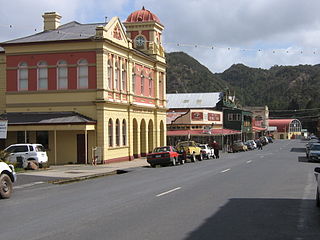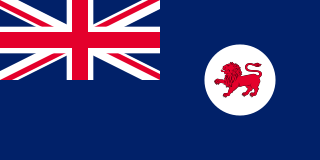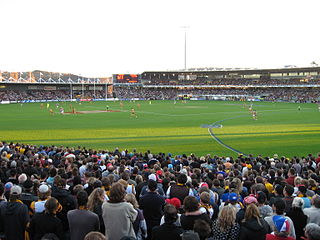 | |
| Location | Queenstown, Tasmania |
|---|---|
| Coordinates | 42°4′33″S145°33′34″E / 42.07583°S 145.55944°E Coordinates: 42°4′33″S145°33′34″E / 42.07583°S 145.55944°E |
| Capacity | 5,000 |
| Surface | Gravel |
| Construction | |
| Opened | 1895 |
| Construction cost | Unknown |
| Architect | Various |
| Tenants | |
| Queenstown Crows Football Club | |
Queenstown Oval, known colloquially as The Gravel or The Rec (for Recreation Ground), is a sports arena in Queenstown, located on the west coast of Tasmania. Built in 1895, it is infamous for its gravel playing surface, and is used primarily for Australian rules football, while also hosting cricket and athletics. [1] The ground has a main concrete grandstand and a total capacity of 5,000.

Queenstown is a town in the West Coast region of the island of Tasmania, Australia. It is in a valley on the western slopes of Mount Owen on the West Coast Range.

The West Coast of Tasmania is the part of the state that is strongly associated with wilderness, mining and tourism, rough country and isolation. As well as that, it was an early convict settlement location in the early stages of Van Diemen's Land.

Tasmania is an island state of Australia. It is located 240 km (150 mi) to the south of the Australian mainland, separated by Bass Strait. The state encompasses the main island of Tasmania, the 26th-largest island in the world, and the surrounding 334 islands. The state has a population of around 533,308 as of March 2019. Just over forty percent of the population resides in the Greater Hobart precinct, which forms the metropolitan area of the state capital and largest city, Hobart.
For nearly a century, Queenstown Oval was the grand final venue for the now defunct Western Tasmanian Football Association. [2] It is currently the home ground for the local Queenstown Crows in the Darwin Football Association. The ground was the first in Tasmania to have a siren installed to signal the start and end of each quarter. It was borrowed from the Mt Lyell Mines. [3] [4]
The Darwin Football Association is an Australian rules football league in Tasmania. The clubs belonging to the association are from localities close to Burnie and on the West Coast of Tasmania. This includes Queenstown, making this competition the only competition in Australia to play some of its games on a gravel surface.
Mount Lyell Mining and Railway Company was a Tasmanian mining company formed on 29 March 1893, most commonly referred to as Mount Lyell. Mount Lyell was the dominant copper mining company of the West Coast from 1893 to 1994, and was based in Queenstown, Tasmania.
Inducted into the Tasmanian Football Hall of Fame in 2007, [1] the ground was due for updating in the 2010s [5] and was part of The Unconformity festival in 2016. [6]
The Tasmanian Football Hall of Fame was established to help recognise outstanding services and overall contribution made to the sport of Australian rules football in Tasmania. Any participant of the sport, including players, umpires, media personalities and coaches, may be inducted. A physical hall was established in 2005 after the Tasmanian Community Fund provided a $50,000 grant to assist AFL Tasmania and the Launceston City Council with establishment of a permanent facility at York Park. The decision to locate the Hall of Fame at the ground was because the site had recently been redeveloped and was positioned as the "true home of Tasmanian football". AFL Tasmania initiated the Hall of Fame nomination process, with a number of clubs, players and grounds nominated and accepted into the Hall of Fame since 2005. The public Hall of Fame opened to the public on Saturday 21 February 2009.
The Unconformity is an arts festival held in Queenstown, Tasmania in Australia.
There is a subtle reference to the ground's gravel playing surface in Jamie Cooper's Tasmania's Team of the Century painting, with gravel visible in the knees of Queenstown-born Australian football legend Ian Stewart. [7]
Jamie Cooper is an Australian painter and former Australian rules footballer in the Victorian Football League.
Ian Harlow Stewart is a former Australian rules footballer who represented St Kilda and Richmond in the Victorian Football League (VFL) during the 1960s and 1970s. He later coached South Melbourne and Carlton and was an administrator at St Kilda.







